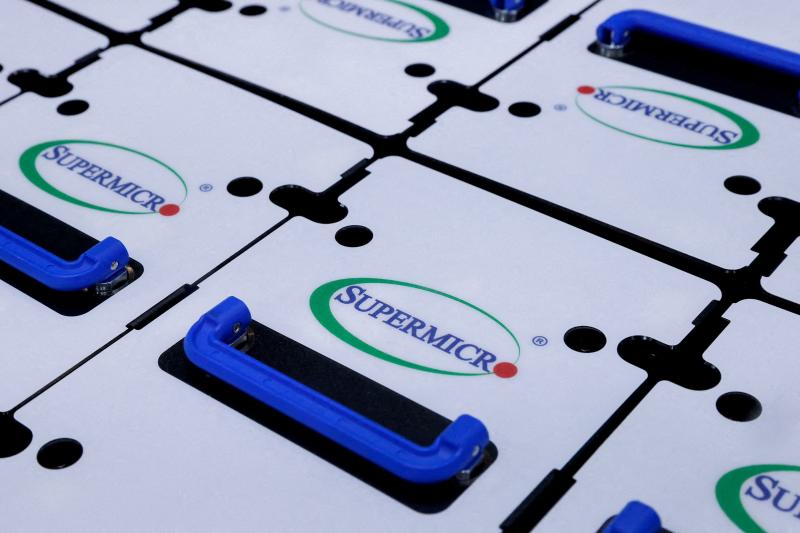Super Micro Computer Inc shares turned negative for the year on Thursday, as cascading concerns about the server maker’s finances continued to weigh on the stock.
Shares fell 16 percent on Thursday, building on the previous session’s slump of about 33 percent. The week’s selloff came after Ernst & Young LLP resigned as the company’s auditor, citing concerns about governance and transparency.
The stock had previously risen more than 300 percent to hit a peak in March of this year, making it one of the most prominent winners of investments in infrastructure related to artificial intelligence (AI). It has now lost all of that advance, tumbling by more than 75 percent since the March peak.

Photo: Ann Wang, Reuters
The auditor news is the latest red flag for the stock. Earlier this year, a short seller alleged accounting problems at Super Micro, and the company subsequently delayed a 10-K filing, saying it needed more time to assess its internal controls.
Argus Research downgraded the stock to "hold" from "buy" on Thursday, writing that the company’s loss of its auditing firm and a US Department of Justice probe “mean that the stock no longer trades on fundamentals.”
Still, analyst Jim Kelleher remains positive on the company’s long-term prospects, and “will look to get Super Micro back on the "buy" list once the company engages with a new accounting firm, becomes timely on its filings, and resolves all matters before the DoJ.”

Taiwan’s technology protection rules prohibits Taiwan Semiconductor Manufacturing Co (TSMC, 台積電) from producing 2-nanometer chips abroad, so the company must keep its most cutting-edge technology at home, Minister of Economic Affairs J.W. Kuo (郭智輝) said yesterday. Kuo made the remarks in response to concerns that TSMC might be forced to produce advanced 2-nanometer chips at its fabs in Arizona ahead of schedule after former US president Donald Trump was re-elected as the next US president on Tuesday. “Since Taiwan has related regulations to protect its own technologies, TSMC cannot produce 2-nanometer chips overseas currently,” Kuo said at a meeting of the legislature’s

TECH WAR CONTINUES: The suspension of TSMC AI chips and GPUs would be a heavy blow to China’s chip designers and would affect its competitive edge Taiwan Semiconductor Manufacturing Co (TSMC, 台積電), the world’s biggest contract chipmaker, is reportedly to halt supply of artificial intelligence (AI) chips and graphics processing units (GPUs) made on 7-nanometer or more advanced process technologies from next week in order to comply with US Department of Commerce rules. TSMC has sent e-mails to its Chinese AI customers, informing them about the suspension starting on Monday, Chinese online news outlet Ijiwei.com (愛集微) reported yesterday. The US Department of Commerce has not formally unveiled further semiconductor measures against China yet. “TSMC does not comment on market rumors. TSMC is a law-abiding company and we are

FLEXIBLE: Taiwan can develop its own ground station equipment, and has highly competitive manufacturers and suppliers with diversified production, the MOEA said The Ministry of Economic Affairs (MOEA) yesterday disputed reports that suppliers to US-based Space Exploration Technologies Corp (SpaceX) had been asked to move production out of Taiwan. Reuters had reported on Tuesday last week that Elon Musk-owned SpaceX had asked their manufacturers to produce outside of Taiwan given geopolitical risks and that at least one Taiwanese supplier had been pushed to relocate production to Vietnam. SpaceX’s requests place a renewed focus on the contentious relationship Musk has had with Taiwan, especially after he said last year that Taiwan is an “integral part” of China, sparking sharp criticism from Taiwanese authorities. The ministry said

US President Joe Biden’s administration is racing to complete CHIPS and Science Act agreements with companies such as Intel Corp and Samsung Electronics Co, aiming to shore up one of its signature initiatives before US president-elect Donald Trump enters the White House. The US Department of Commerce has allocated more than 90 percent of the US$39 billion in grants under the act, a landmark law enacted in 2022 designed to rebuild the domestic chip industry. However, the agency has only announced one binding agreement so far. The next two months would prove critical for more than 20 companies still in the process